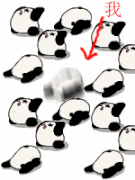【NOIP2019模拟11.01】Game(贪心+线段树)
Description:
小 A 和小 B 在玩一个游戏,他们两个人每人有 𝑛 张牌,每张牌有一个点数,并且在接下来的 𝑛 个回合中每回合他们两人会分别打出手中的一张牌,点数严格更高的一方得一分,然而现在小 A 通过某种神秘的方法得到了小 B 的出牌顺序,现在他希望规划自己的出牌顺序使得自己在得分尽可能高的前提下出牌的字典序尽可能大。
题解:
考虑求最高的得分。
每个人肯定希望打比他低的又最高的。
所以排个序,扫一遍即可,正着扫倒着扫好像都可以。
现在要字典序最大,考虑逐位确定。
发现每一位可以二分,那么要支持删除的情况下动态维护最高得分。
显然可以线段树,要维护三个标记,已经匹配的,a剩下多少,b剩下多少。
直接搞就是。
考虑线段树多维护一个东西表示在这个区间删掉最左的之后的三个标记。
那就可以在线段树上面二分了,复杂度:。
Code:
复制#include<bits/stdc++.h>
#define fo(i, x, y) for(int i = x, B = y; i <= B; i ++)
#define ff(i, x, y) for(int i = x, B = y; i < B; i ++)
#define fd(i, x, y) for(int i = x, B = y; i >= B; i --)
#define ll long long
#define pp printf
#define hh pp("\n")
using namespace std;
const int N = 1e5 + 5;
int n;
int a[N], b[N];
const int inf = 1e9;
struct nod {
int x, y, z;
nod() {
x = y = z = 0;
}
} t[N * 4], g[N * 4];
#define i0 i + i
#define i1 i + i + 1
void upd(nod &a, nod b, nod c) {
if(b.z < 0 || c.z < 0) a.z = -inf; else
a.z = b.z + c.z + min(c.x, b.y);
a.y = c.y + max(0, b.y - c.x);
a.x = b.x + max(0, c.x - b.y);
}
int pl, pr, px, py;
void add(int i, int x, int y) {
if(x == y) {
if(!py) t[i].x += px; else t[i].y += px;
g[i] = t[i]; g[i].x --;
if(g[i].x < 0) g[i].z = -inf;
return;
}
int m = x + y >> 1;
if(pl <= m) add(i0, x, m); else add(i1, m + 1, y);
upd(t[i], t[i0], t[i1]);
upd(g[i], g[i0], t[i1]);
if(g[i].z < 0) upd(g[i], t[i0], g[i1]);
}
int ans, ans2[N];
nod pc, pd;
void qu(int i, int x, int y) {
if(y < pl || x > pr) return;
if(x >= pl && y <= pr) {
upd(pc, pc, t[i]);
return;
}
int m = x + y >> 1;
qu(i0, x, m); qu(i1, m + 1, y);
}
struct P {
int i, x, y;
} d[50]; int d0;
void ft(int i, int x, int y) {
if(y < pl || x > pr) return;
int m = x + y >> 1;
if(x >= pl && y <= pr) {
d[++ d0] = (P) {i, x, y};
return;
}
ft(i0, x, m); ft(i1, m + 1, y);
}
nod p[50], q[50];
void dg(int i, int x, int y) {
int m = x + y >> 1;
nod pe; upd(pe, g[i], pd); upd(pe, pc, pe);
if(pe.z < ans - py) return;
if(x == y) {
px = x; return;
}
pe = pc; upd(pc, pc, t[i0]);
dg(i1, m + 1, y);
pc = pe;
if(px) return;
pe = pd; upd(pd, t[i1], pd);
dg(i0, x, m);
pd = pe;
}
void gg() {
d0 = 0; ft(1, 1, 1e5);
p[0] = pc; q[d0 + 1] = pd;
fo(i, 1, d0) upd(p[i], p[i - 1], t[d[i].i]);
fd(i, d0, 1) upd(q[i], t[d[i].i], q[i + 1]);
fd(i, d0, 1) {
pc = p[i - 1], pd = q[i + 1];
dg(d[i].i, d[i].x, d[i].y);
if(px) return;
}
}
int main() {
freopen("game.in", "r", stdin);
freopen("game.out", "w", stdout);
scanf("%d", &n);
fo(i, 1, 1e5 * 4) g[i].z = -inf, g[i].x = -1;
fo(i, 1, n) scanf("%d", &b[i]);
fo(i, 1, n) scanf("%d", &a[i]);
fo(i, 1, n) {
pl = pr = b[i]; py = 1; px = 1;
add(1, 1, 1e5);
pl = pr = a[i]; py = 0; px = 1;
add(1, 1, 1e5);
}
ans = t[1].z;
fo(i, 1, n) {
pl = pr = b[i]; px = -1; py = 1;
add(1, 1, 1e5);
pl = 1, pr = b[i]; pc = pd = nod();
qu(1, 1, 1e5);
py = 1, pl = b[i] + 1, pr = 1e5; px = 0;
gg();
if(px) {
ans2[i] = px;
ans --;
pl = pr = px; py = 0; px = -1;
add(1, 1, 1e5);
continue;
}
pl = b[i] + 1, pr = 1e5; pc = pd = nod();
qu(1, 1, 1e5); swap(pc, pd);
py = 0, pl = 1, pr = b[i]; px = 0;
gg();
ans2[i] = px;
pl = pr = px; py = 0; px = -1;
add(1, 1, 1e5);
}
fo(i, 1, n) pp("%d ", ans2[i]); hh;
}
转载注意标注出处:
转自Cold_Chair的博客+原博客地址




【推荐】国内首个AI IDE,深度理解中文开发场景,立即下载体验Trae
【推荐】编程新体验,更懂你的AI,立即体验豆包MarsCode编程助手
【推荐】抖音旗下AI助手豆包,你的智能百科全书,全免费不限次数
【推荐】轻量又高性能的 SSH 工具 IShell:AI 加持,快人一步
· AI与.NET技术实操系列:向量存储与相似性搜索在 .NET 中的实现
· 基于Microsoft.Extensions.AI核心库实现RAG应用
· Linux系列:如何用heaptrack跟踪.NET程序的非托管内存泄露
· 开发者必知的日志记录最佳实践
· SQL Server 2025 AI相关能力初探
· 震惊!C++程序真的从main开始吗?99%的程序员都答错了
· winform 绘制太阳,地球,月球 运作规律
· 【硬核科普】Trae如何「偷看」你的代码?零基础破解AI编程运行原理
· 上周热点回顾(3.3-3.9)
· 超详细:普通电脑也行Windows部署deepseek R1训练数据并当服务器共享给他人